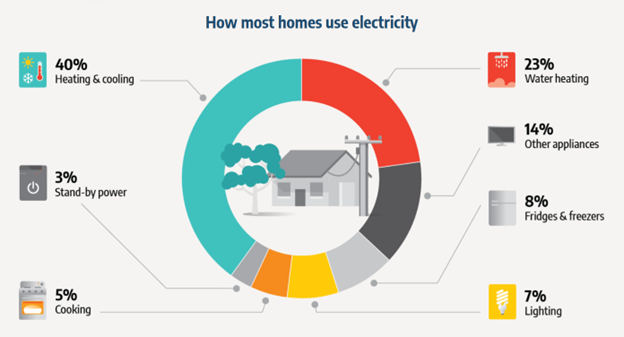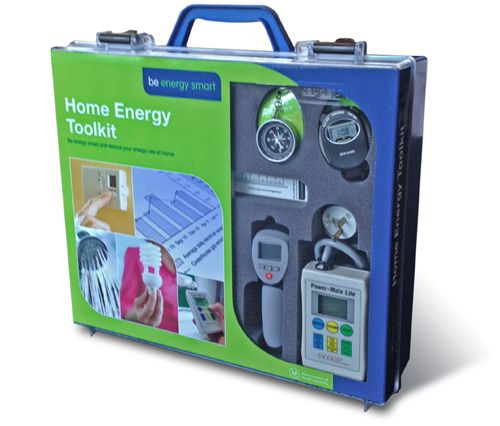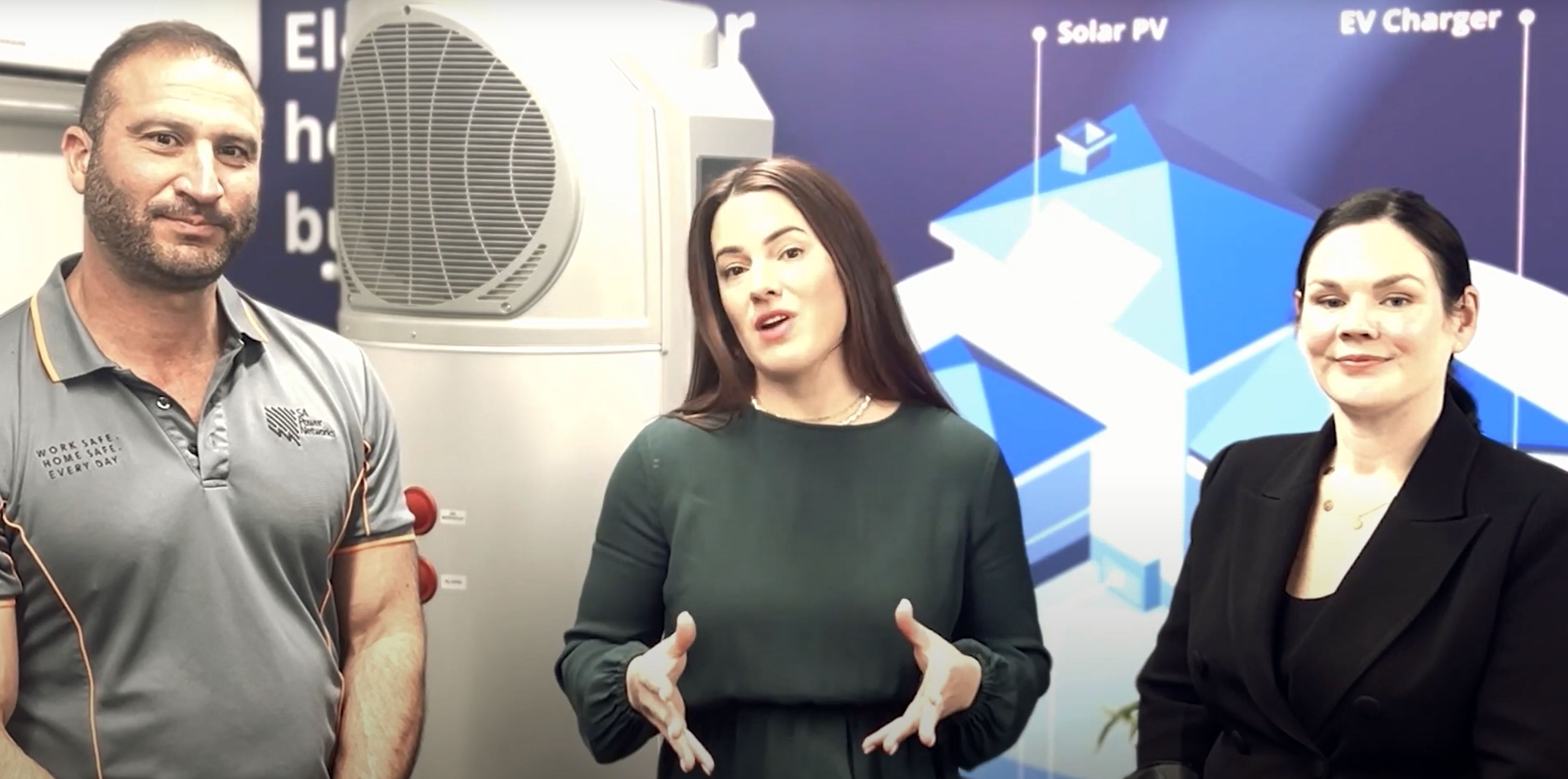What are the benefits when you save energy?
Making your home as energy-efficient as possible can make a big difference both to the environment and to your wallet.
Reducing the amount of energy you use is easier than you think. By making a few simple changes to your daily habits and how you use your appliances, you can significantly reduce your energy consumption and save money on your power bills.
Where do we use the most energy in our homes?
The simplest way to save energy is to find out where and when you use the most electricity in your home. This enables you to target areas where it’s possible to save electricity and become more energy efficient.
The diagram below shows how energy is used in a typical South Australian home.

Did you know? Your hot water, heating and cooling systems consume up to 60% of the energy used in the average home.
How to save energy in your home
Make quick wins in these key areas.
Heating and cooling together make up the highest percentage of energy use in the average home. To save energy in this area:
Adjust your thermostat
For every 1°C lower (for heating) and 1°C higher (for cooling) that you set your heating and cooling system, you could reduce the running costs of these appliances by up to 10%.
- In summer, set the temperature between 24° and 27° Celsius.
- In winter, set the temperature between 18° and 21° Celsius.
Reduce the size and number of areas that you heat or cool
A simple way to be more energy efficient is to only heat or cool the rooms you are using.
If you have reverse cycle air conditioning, try and limit the size of the area where heating or cooling is required. You can do this by closing doors to unused rooms and hallways. This will help to save electricity and increase overall energy efficiency.
Plug the gaps
If you are able to block cracks around doors or window frames and reduce draughts, you won’t lose air that has been heated or cooled.
All the appliances in your home collectively make up the second largest area of energy use. These are generally split as below:
- Appliances like televisions, dishwashers and clothes washing machines - 14%
- Fridges and freezers - 8%
- Cooking - 5%
One of the best ways to save energy is by installing energy efficient appliances. While this might require a greater upfront investment, it will generally pay for itself in the long-run.
Star ratings give you a quick, visual guide to the energy efficiency of an appliance, compared to other similar sized models. The more stars a product has, the greater its energy efficiency.
You can learn more about star ratings and what they mean at the Energy Rating website.
The following tips can help you to save electricity and create a more energy efficient home:
Fridges and freezers
- Set the freezer temperature to -15°C to -18°C.
- Set the fridge temperature to – 3°C to 5°C degrees.
- Check the seals are in good condition and effectively sealing the cold air in.
Laundry
- Wash clothes in cold water.
- Hang clothes out to dry rather than using an electric clothes dryer.
Kitchen
- Thaw frozen food naturally in the fridge rather than using a microwave
- Place a lid on pots while cooking to prevent heat loss.
- Microwave ovens, slow cookers and pressure cookers use less energy than a stove.
- When using an oven, keep the door closed as much as possible.
Rebates
You may be eligible for a rebate when you buy an energy efficient appliance through the Retailer Energy Productivity Scheme (REPS).
The scheme has been designed to improve household and business energy efficiency, as well as the energy grid as a whole. It is especially helpful for low-income households looking to save money on power bill costs.
Heating water for washing clothes, dishes and taking showers makes up 23% of the average household's energy use. To save energy on hot water heating:
Heating water during the cheapest times
Water heating has historically been done during the middle of the night on a controlled load tariff, when there is very low demand for energy.
However, with an abundance of solar energy available during the middle of the day, it is worth considering moving your hot water heating to this time in order to take advantage of all the clean, green energy being generated across the state.
Learn more about the tariffs that apply at different times of the day that can enable you to save money on power bill costs.
Use less water
The less hot water you use, the less water you need to heat. You can decrease your water use by:
- Installing a water efficient shower head.
- Taking shorter showers.
- Using the cold washing cycle on your washing machine.
Efficient hot water heating
If you have an electric storage hot water system, consider replacing it with a solar hot water system or a heat pump water heater that will enable you to be more energy efficient.
One of the simplest ways to save energy is by using energy efficient LED lighting. Switching old lights to longer-lasting LEDs will mean you have to replace lightbulbs less often, and you will save money on power bill costs.
- Switch to energy efficient LED bulbs, which use significantly less energy and last longer.
- Use timer switches that automatically turn off lights in unused rooms to avoid wasting energy.
- Turning off the lights when you leave a room is a simple way to save electricity.
Although it’s convenient, keeping devices like TVs and laptops on standby power costs you more money than you might think. It makes up around 3% of the total energy use in the average home.
You can reduce your phantom power consumption and save money by unplugging your devices when they are not in use.
Learn about energy efficiency in the home with Detective Watts in this interactive game.
Rebates for energy efficient appliances
You may be eligible for a rebate when you buy an energy efficient appliance through the Retailer Energy Productivity Scheme (REPS).
The scheme has been designed to improve household and business energy efficiency, as well as the energy grid as a whole. It is especially helpful for low-income households looking to save money on power bill costs.
Electricity tariffs and how energy use is charged
Your retailer charges you for the electricity used in your home based on a specific tariff (an amount per kilowatt of energy consumed). Retailers offer a range of tariffs. By selecting the right tariff for your electricity consumption, you can make significant savings on your energy bill.
Learn more about the different Tariffs we charge to distribute your electricity.
Top tip! If you use energy during the middle of the day when the sun is shining, it is usually cheaper and greener.
The benefits of doing an energy audit
An energy audit will help you to look at all the different aspects of your home's energy use, so that you can identify areas where you can save electricity, become more energy efficient, and reduce the size of your power bill.
Undertaking an audit will help you to identify the appliances that use the most energy, as well as suggest ways in which you can save electricity and money by reducing their operating costs and becoming more energy efficient.
This handy energy audit guide is a great place to start. It will help you to identify the appliances that are likely to be the major sources of energy use around the home, as well as useful tips on how you can save money on power bill costs.
If you want to conduct a more detailed energy audit, you can borrow a Home Energy Toolkit from your local library. The kit includes an appliance meter, an infrared thermometer, a spirit thermometer, compass and a stopwatch, which you can use to measure energy use across your home.

Where to go for help on being more energy efficient
Learn how to read you energy bill
Understanding how you are charged for the electricity you use is one of the best ways to become more energy efficient and save money on power bill costs. Read more about understanding power pricing.
Compare energy plans
The Energy Made Easy website makes it quick and easy to compare energy plans based on where you live, your property and your energy usage.
REPS Scheme
The Retailer Energy Productivity Scheme (REPS) provides incentives for South Australian homes and businesses to save energy. If eligible you may be able to access at reduced cost what are known as productivity activities, i.e., energy efficient lighting, water saving shower heads, hot water upgrades, air conditioner upgrades, or energy efficient appliances such as a fridge, freezer or clothes dryer.
Concessions, emergency payments and loans
Emergency Electricity Payment Scheme
If you are experiencing financial hardship, you may be able to get assistance with your energy bills via the Emergency Electricity Payment Scheme (EEPS). Up to $800 may be available once every 2 years if you have an electricity debt, you’re at risk of being disconnected, or your electricity supply has already been disconnected.
To apply for EEPS, contact a financial counsellor who will assess your financial situation before lodging an application on your behalf.
Energy Concession
Depending on your energy retailer, if you are on a low or fixed income you may be able to get assistance with electricity costs at your principal place of residence in the form of a concession.
No Interest Loans
No Interest Loans (NIL) up to $2000 are available in certain circumstances for essential goods and services, including assistance with electricity bills.
Contact Good Shepherd to find out more about no interest loans.
